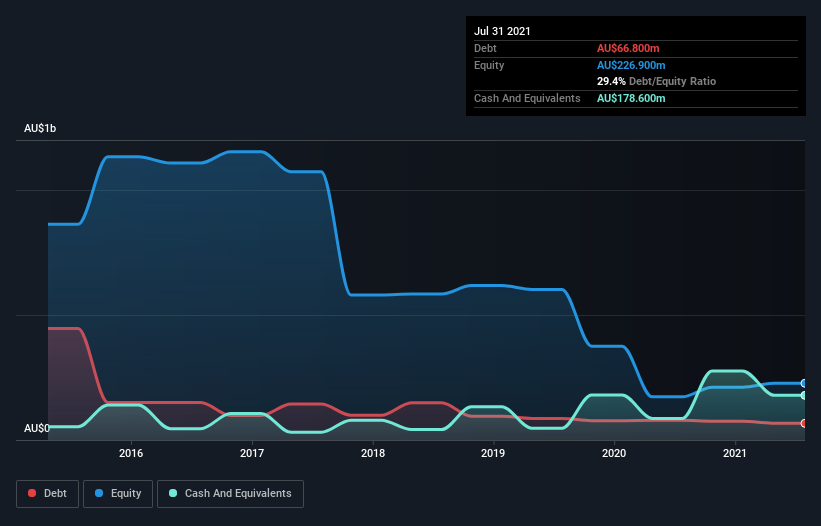Myer Holdings (ASX:MYR) Seems To Use Debt Quite Sensibly

Some say volatility, rather than debt, is the best way to think about risk as an investor, but Warren Buffett famously said that 'Volatility is far from synonymous with risk.' When we think about how risky a company is, we always like to look at its use of debt, since debt overload can lead to ruin. We can see that Myer Holdings Limited (ASX:MYR) does use debt in its business. But the real question is whether this debt is making the company risky.
When Is Debt Dangerous?
Debt assists a business until the business has trouble paying it off, either with new capital or with free cash flow. Ultimately, if the company can't fulfill its legal obligations to repay debt, shareholders could walk away with nothing. However, a more usual (but still expensive) situation is where a company must dilute shareholders at a cheap share price simply to get debt under control. Of course, plenty of companies use debt to fund growth, without any negative consequences. When we examine debt levels, we first consider both cash and debt levels, together.
See our latest analysis for Myer Holdings
What Is Myer Holdings's Net Debt?
You can click the graphic below for the historical numbers, but it shows that Myer Holdings had AU$66.8m of debt in July 2021, down from AU$78.6m, one year before. But on the other hand it also has AU$178.6m in cash, leading to a AU$111.8m net cash position.

How Healthy Is Myer Holdings' Balance Sheet?
Zooming in on the latest balance sheet data, we can see that Myer Holdings had liabilities of AU$590.3m due within 12 months and liabilities of AU$1.65b due beyond that. Offsetting these obligations, it had cash of AU$178.6m as well as receivables valued at AU$16.0m due within 12 months. So its liabilities total AU$2.05b more than the combination of its cash and short-term receivables.
This deficit casts a shadow over the AU$349.0m company, like a colossus towering over mere mortals. So we'd watch its balance sheet closely, without a doubt. After all, Myer Holdings would likely require a major re-capitalisation if it had to pay its creditors today. Given that Myer Holdings has more cash than debt, we're pretty confident it can handle its debt, despite the fact that it has a lot of liabilities in total.
Notably, Myer Holdings's EBIT launched higher than Elon Musk, gaining a whopping 145% on last year. The balance sheet is clearly the area to focus on when you are analysing debt. But ultimately the future profitability of the business will decide if Myer Holdings can strengthen its balance sheet over time. So if you're focused on the future you can check out this free report showing analyst profit forecasts.
But our final consideration is also important, because a company cannot pay debt with paper profits; it needs cold hard cash. Myer Holdings may have net cash on the balance sheet, but it is still interesting to look at how well the business converts its earnings before interest and tax (EBIT) to free cash flow, because that will influence both its need for, and its capacity to manage debt. Happily for any shareholders, Myer Holdings actually produced more free cash flow than EBIT over the last three years. There's nothing better than incoming cash when it comes to staying in your lenders' good graces.
Summing up
Although Myer Holdings's balance sheet isn't particularly strong, due to the total liabilities, it is clearly positive to see that it has net cash of AU$111.8m. The cherry on top was that in converted 146% of that EBIT to free cash flow, bringing in AU$220m. So we don't have any problem with Myer Holdings's use of debt. There's no doubt that we learn most about debt from the balance sheet. However, not all investment risk resides within the balance sheet - far from it. Be aware that Myer Holdings is showing 2 warning signs in our investment analysis , and 1 of those can't be ignored...
Of course, if you're the type of investor who prefers buying stocks without the burden of debt, then don't hesitate to discover our exclusive list of net cash growth stocks, today.
New: Manage All Your Stock Portfolios in One Place
We've created the ultimate portfolio companion for stock investors, and it's free.
• Connect an unlimited number of Portfolios and see your total in one currency
• Be alerted to new Warning Signs or Risks via email or mobile
• Track the Fair Value of your stocks
Have feedback on this article? Concerned about the content? Get in touch with us directly. Alternatively, email editorial-team (at) simplywallst.com.
This article by Simply Wall St is general in nature. We provide commentary based on historical data and analyst forecasts only using an unbiased methodology and our articles are not intended to be financial advice. It does not constitute a recommendation to buy or sell any stock, and does not take account of your objectives, or your financial situation. We aim to bring you long-term focused analysis driven by fundamental data. Note that our analysis may not factor in the latest price-sensitive company announcements or qualitative material. Simply Wall St has no position in any stocks mentioned.
About ASX:MYR
Myer Holdings
Engages in the operation of department stores under the Myer brand name in Australia.
Second-rate dividend payer with questionable track record.


